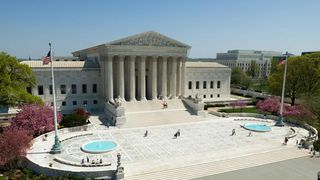Supremes Scrap Federal Sports Betting Ban

The Supreme Court has ruled 6-3 that Congress can't prevent states from allowing sports betting, reversing a Third Circuit decision that a federal sports betting prohibition was constitutional.
The move paves the way for more states to legalize sports betting, previously almost the exclusive province of Las Vegas. It also could take a huge bite out of fantasy sports sites like FanDuel and DraftKings, whose season-long contests helped fill the void, though they are also positioned to morph their businesses into the real thing.
In fact, DraftKings was quick to announce it would be getting into the non-fantasy sports betting business. "Our mission has always been to bring fans closer to the sports they love and now, thanks to the wisdom of the Supreme Court, DraftKings will be able to harness our proven technology to provide our customers with innovative online sports betting products," said CEO Jason Robins. "This ruling gives us the ability to further diversify our product offerings and build on our unique capacity to drive fan engagement." "Today's Supreme Court ruling is welcome news to the millions of Americans who currently wager $150 billion illegally each year through off-shore, black market bookies," said Robins in a statement. "States are now free to allow their residents to place mobile sports bets with licensed, trusted companies based in the U.S. and that pay taxes here."
The Professional and Amateur Sports Protection Act (PASPA) has made it "unlawful for a State or its subdivisions 'to sponsor, operate, advertise, promote, license, or authorize by law or compact ... a lottery, sweepstakes, or other betting, gambling, or wagering scheme based...on' competitive sporting events."
PASPA had prevented states from legalizing sports betting, while grandfathering four states with sports betting laws on the books--Nevada, Oregon, Delaware and Montana.
New Jersey, where residents subsequently approved sports betting, said PASPA was unconstitutional because it prevented the state from modifying or repealing its laws prohibiting sports gambling. The court agreed.
"The distinction between compelling a State to enact legislation and prohibiting a State from enacting new laws is an empty one," Justice Samuel Alito wrote for the majority. "The basic principle — that Congress cannot issue direct orders to state legislatures—applies in either event.
Broadcasting & Cable Newsletter
The smarter way to stay on top of broadcasting and cable industry. Sign up below
"The legalization of sports gambling requires an important policy choice, but the choice is not ours to make. Congress can regulate sports gambling directly, but if it elects not to do so, each state is free to act on its own," Justice Alito added.
"This is a victory not only for states, but for the First Amendment and commercial speech, whose exercise has been restricted by the inability of these companies to advertise their activities," said Adonis Hoffman, chairman of Business in the Public Interest and formerly SVP abnd general counsel with the American Association of Advertising Agencies. "With the existence of many gambling venues and platforms, it is about time federal laws caught up with reality."
Contributing editor John Eggerton has been an editor and/or writer on media regulation, legislation and policy for over four decades, including covering the FCC, FTC, Congress, the major media trade associations, and the federal courts. In addition to Multichannel News and Broadcasting + Cable, his work has appeared in Radio World, TV Technology, TV Fax, This Week in Consumer Electronics, Variety and the Encyclopedia Britannica.

